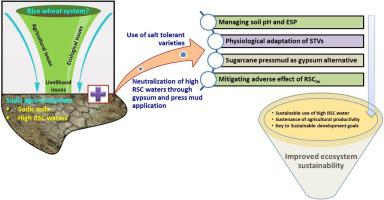当前位置:
X-MOL 学术
›
Agric. Water Manag.
›
论文详情
Our official English website, www.x-mol.net, welcomes your feedback! (Note: you will need to create a separate account there.)
Ameliorants and salt tolerant varieties improve rice-wheat production in soils undergoing sodification with alkali water irrigation in Indo–Gangetic Plains of India
Agricultural Water Management ( IF 6.7 ) Pub Date : 2021-01-01 , DOI: 10.1016/j.agwat.2020.106492 Parvender Sheoran , Nirmalendu Basak , Ashwani Kumar , R.K. Yadav , Randhir Singh , Raman Sharma , Satyendra Kumar , Ranjay K. Singh , P.C. Sharma
Agricultural Water Management ( IF 6.7 ) Pub Date : 2021-01-01 , DOI: 10.1016/j.agwat.2020.106492 Parvender Sheoran , Nirmalendu Basak , Ashwani Kumar , R.K. Yadav , Randhir Singh , Raman Sharma , Satyendra Kumar , Ranjay K. Singh , P.C. Sharma

|
Abstract This work evaluates the combine efficacy of chemical (gypsum, Gyp) and/or organic (pressmud, PM) amendments with salt-tolerant varieties (STVs) for ameliorating the deleterious effects of bicarbonate dominated residual alkalinity in irrigation water (RSCiw) on changes in soil properties, plant adaptation mechanisms and crop performance of rice-wheat system (RWS) in Trans Indo-Gangetic Plains. Continuous irrigation with high RSCiw gradually increased the soil pH and exchangeable sodium percentage (ESP) and reduced rice and wheat productivity by 16 and 14%, respectively. Use of Gyp and PM ameliorated RSCiw improved physiological traits of both crops under stress conditions through significant improvement in relative water content (RWC, 6 and 10%); photosynthetic efficiency (Pn, 40 and 36 %); stomatal conductance (gS, 46 and 52%); transpiration rate (E, 72 and 45%); chlorophyll fluorescence (Fv/Fm, 13 and 12%); photon quantum yield (YII, 12 and 6%) and reduced membrane injury index (MII, 23 and 17%) and ionic concentration of Na+/K+ in shoot (48 and 37%) and root (45 and 37%). Highest rice (3.42 t ha−1) and wheat (4.30 t ha−1) yields were realized with Gyp + PM ameliorated RSCiw elucidating ∼25% yield advantage compared to unamended control. With increased RSCiw, STVs of aromatic rice (CSR 30 Basmati) and wheat (KRL 210) exhibited better performance owing to lesser yield reduction (12 and 11%) compared to traditional rice (PB 1121; 18%) and wheat (HD 2967; 16%) varieties. This study suggests that growing of STVs with Gyp + PM ameliorated RSC waters can mitigate adverse effects of RSCiw on soil health, improve agro-physiological adaptation and sustain the productivity of RWS. Field applicability of PM as soil ameliorant can help to address its safer disposal vis-a-vis potential alternative to gypsum in long-run. These results can be extended to larger areas undergoing high RSCiw induced soil sodification, further mitigating land and environment degradation in salt affected areas of India and similar agro-ecosystems.
中文翻译:

改良剂和耐盐品种在印度-恒河平原碱水灌溉碱化土壤中提高稻麦产量
摘要 本工作评估了化学(石膏、Gyp)和/或有机(压泥、PM)添加物与耐盐品种(STV)的组合功效,以改善以碳酸氢盐为主的灌溉水中残留碱度(RSCiw)对变化的有害影响。跨印度恒河平原稻麦系统(RWS)的土壤特性、植物适应机制和作物性能的研究。高 RSCiw 的连续灌溉逐渐增加了土壤 pH 值和可交换钠百分比 (ESP),并使水稻和小麦的生产力分别降低了 16% 和 14%。使用 Gyp 和 PM 改善了 RSCiw,通过显着改善相对含水量(RWC,6% 和 10%),改善了两种作物在胁迫条件下的生理性状;光合效率(Pn,40 和 36 %);气孔导度(gS,46 和 52%);蒸腾率 (E, 72 和 45%); 叶绿素荧光(Fv/Fm,13% 和 12%);光子量子产率(YII,12 和 6%)和降低的膜损伤指数(MII,23 和 17%)以及芽(48% 和 37%)和根(45% 和 37%)中 Na+/K+ 的离子浓度。通过 Gyp + PM 改善的 RSCiw 实现了最高的水稻(3.42 t ha-1)和小麦(4.30 t ha-1)产量,表明与未修改的对照相比有 25% 的产量优势。随着 RSCiw 的增加,香米(CSR 30 Basmati)和小麦(KRL 210)的 STV 表现出更好的表现,因为与传统水稻(PB 1121;18%)和小麦(HD 2967;HD 2967)相比,产量减少幅度较小(12% 和 11%)。 16%) 品种。这项研究表明,用 Gyp + PM 改善 RSC 水域种植 STV 可以减轻 RSCiw 对土壤健康的不利影响,改善农业生理适应并维持 RWS 的生产力。从长远来看,PM 作为土壤改良剂的现场适用性有助于解决其相对于石膏的潜在替代品更安全的处置问题。这些结果可以扩展到经历高 RSCiw 引起的土壤碱化的更大区域,进一步减轻印度受盐分影响的地区和类似农业生态系统的土地和环境退化。
更新日期:2021-01-01
中文翻译:

改良剂和耐盐品种在印度-恒河平原碱水灌溉碱化土壤中提高稻麦产量
摘要 本工作评估了化学(石膏、Gyp)和/或有机(压泥、PM)添加物与耐盐品种(STV)的组合功效,以改善以碳酸氢盐为主的灌溉水中残留碱度(RSCiw)对变化的有害影响。跨印度恒河平原稻麦系统(RWS)的土壤特性、植物适应机制和作物性能的研究。高 RSCiw 的连续灌溉逐渐增加了土壤 pH 值和可交换钠百分比 (ESP),并使水稻和小麦的生产力分别降低了 16% 和 14%。使用 Gyp 和 PM 改善了 RSCiw,通过显着改善相对含水量(RWC,6% 和 10%),改善了两种作物在胁迫条件下的生理性状;光合效率(Pn,40 和 36 %);气孔导度(gS,46 和 52%);蒸腾率 (E, 72 和 45%); 叶绿素荧光(Fv/Fm,13% 和 12%);光子量子产率(YII,12 和 6%)和降低的膜损伤指数(MII,23 和 17%)以及芽(48% 和 37%)和根(45% 和 37%)中 Na+/K+ 的离子浓度。通过 Gyp + PM 改善的 RSCiw 实现了最高的水稻(3.42 t ha-1)和小麦(4.30 t ha-1)产量,表明与未修改的对照相比有 25% 的产量优势。随着 RSCiw 的增加,香米(CSR 30 Basmati)和小麦(KRL 210)的 STV 表现出更好的表现,因为与传统水稻(PB 1121;18%)和小麦(HD 2967;HD 2967)相比,产量减少幅度较小(12% 和 11%)。 16%) 品种。这项研究表明,用 Gyp + PM 改善 RSC 水域种植 STV 可以减轻 RSCiw 对土壤健康的不利影响,改善农业生理适应并维持 RWS 的生产力。从长远来看,PM 作为土壤改良剂的现场适用性有助于解决其相对于石膏的潜在替代品更安全的处置问题。这些结果可以扩展到经历高 RSCiw 引起的土壤碱化的更大区域,进一步减轻印度受盐分影响的地区和类似农业生态系统的土地和环境退化。



























 京公网安备 11010802027423号
京公网安备 11010802027423号